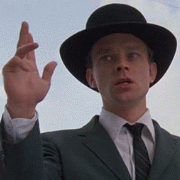|
BWUH??? WUHHHHHHH??????????
|
|
|
|

|
| # ? May 1, 2024 13:52 |
|
Mel Mudkiper posted:there is no such thing as objectively good and objectively bad because the concepts are inherently subjective This is literally the argument I've had ad nauseam in Trad Games over whether or not we can be critical of a game people think is "fun" to play. As far as I can tell, people decide they like a thing for whatever reason, be it social pressure or personal taste, and once they've decided they like it they don't want to consider the possibility that it fails at doing what it sets out to do well.
|
|
|
|
Atlas Hugged posted:This is literally the argument I've had ad nauseam in Trad Games I've found the problem
|
|
|
|
I actually am interested in the division between "genre fiction" and "literature," and whether a useful distinction can actually be drawn. Obviously for bookstores it's a marketing consideration first and foremost--after all, you want to shelf a book where it's most likely that someone who wants to buy it will find it--so the division between what goes on the Literature shelves or the SF/Fantasy shelves at Barnes & Noble isn't all that interesting. My own little not-yet-developed idea is that genre fiction is defined more by its subject matter than literature is. Supernatural elements or certain story beats (especially for mystery novels) might be included in a genre novel specifically because of the genre the author sees the novel existing in, not necessarily because they serve some strong thematic purpose. I should point out that I also don't think this is a bad thing by any means. People should read what they enjoy, and hell, I also don't think reading is an inherently more noble way to consume entertainment than anything else. It's not like literature never has supernatural elements, or that there are no "literary" novels that have a murder mystery as the main plot thread. It's clear that some books are written with a different purpose and goal in mind than others. I don't really know if I can completely put my finger on it, though, and I'm resistant to the idea that there's a completely clear dividing line or that something that is "literary" is Just Plain Better because of its comparatively high-minded goals. Mel Mudkiper posted:there is no such thing as objectively good and objectively bad because the concepts are inherently subjective 
|
|
|
|
Harrow posted:My own little not-yet-developed idea is that genre fiction is defined more by its subject matter than literature is. Supernatural elements or certain story beats (especially for mystery novels) might be included in a genre novel specifically because of the genre the author sees the novel existing in, not necessarily because they serve some strong thematic purpose. I should point out that I also don't think this is a bad thing by any means. People should read what they enjoy, and hell, I also don't think reading is an inherently more noble way to consume entertainment than anything else. My developed idea is that genre is a marketing concept and not actually reflective of the book's content but on the publisher's imagined ideal audience
|
|
|
|
Mel Mudkiper posted:My developed idea is that genre is a marketing concept and not actually reflective of the book's content but on the publisher's imagined ideal audience I suppose so. But authors use the idea, too, and I think that necessarily affects the content of their books. If Author A writes a book intending to write A Science Fiction Book, and Author B writes a book about some sort of Idea and thinks that <insert science fiction concept here> would be an interesting or effective way to explore that idea, they're going to write different books. It's not entirely about publishers. And Author A's book might be awesome and smart and Author B's book might be lovely and dumb, or vice versa, but they definitely have different goals and will approach the subject matter differently regardless of quality. Whether that constitutes "genre" is something it seems we disagree on. To me, discarding that label when writers can and do write within a genre's conventions consciously seems like throwing away a potentially useful discussion tool on principle.
|
|
|
|
Mel Mudkiper posted:well to be fair ideally in criticism the author shouldn't even be considered I'm charitable enough to think you know why this is stupid but just in case you don't or someone else doesn't: the author (real human past or present you can point to/look at the grave of) maybe shouldn't be considered when doing crit. The Author on the other hand (i.e. the presumption that this piece of writing was constructed by a human and isn't just incredibly fortuitous collections of ink) absolutely should have motives ascribed to them cos otherwise lit crit is just a list of things that happen in the book with no attempt to create any kind of theory of what was meant. That's even if the little a author should be disregarded which isn't exactly uncontroversial
|
|
|
|
Harrow posted:I suppose so. But authors use the idea, too, and I think that necessarily affects the content of their books. If Author A writes a book intending to write A Science Fiction Book, and Author B writes a book about some sort of Idea and thinks that <insert science fiction concept here> would be an interesting or effective way to explore that idea, they're going to write different books. e. The author does not determine the significance of the book. The reader does. Ultimately at best an author can only be a reader of their own work, finding what they consider personally significant in the text but not mandating that significance on others.
|
|
|
|
CestMoi posted:The Author on the other hand (i.e. the presumption that this piece of writing was constructed by a human and isn't just incredibly fortuitous collections of ink) absolutely should have motives ascribed to them cos otherwise lit crit is just a list of things that happen in the book with no attempt to create any kind of theory of what was meant. Why is a capital A Author needed for meaning? Text creates meaning.
|
|
|
|
Mel Mudkiper posted:Why is a capital A Author needed for meaning? Text creates meaning. Are you or are you not aware of the process we call "writing"
|
|
|
|
CestMoi posted:Are you or are you not aware of the process we call "writing" Yes, but literary criticism is about the process we call "reading" Do we assume Beowulf has no meaning because we have no "Author" who created it
|
|
|
|
Mel Mudkiper posted:Yes, but literary criticism is about the process we call "reading" Are you loving dense
|
|
|
|
you keep tossing insults without exactly explaining what a reading that assumes the author provides in terms of critical value that a reading that does not assume the author lacks
|
|
|
|
Mel Mudkiper posted:The author does not determine the significance of the book. The reader does. Ultimately at best an author can only be a reader of their own work, finding what they consider personally significant in the text but not mandating that significance on others. Mel Mudkiper posted:Why is a capital A Author needed for meaning? Text creates meaning. While an author's intentions--whether they're stated or whether we're trying to intuit them from the text--are never the final word on a text, nor are they necessarily a useful starting point for critical discussion, those intentions do have an effect on the final product. It's not like fiction writing involves entering a trance state through which words unconsciously flow from an author's brain onto a page, independent of what that author tries to consciously do. Authors can set out to write different kinds of books and end up indeed writing different kinds of books. A book like The Golem and the Jinni treats its fantastical elements very differently than Proven Guilty (a Dresden Files book), even though they both feature jinni and at least one wizard. They use them for different purposes and tell very different kinds of stories with them. Their styles are nothing alike, nor are their goals as stories. Maybe we can discard "genre" as the term we use here, but how else should we describe those differences? If we want to recommend a book to someone, what criteria do we use to figure out if we should recommend something like The Golem and the Jinni or something like Proven Guilty? If we want to compare a book critically to another with similar aims, do we start from scratch every time to determine the points of comparison? We may chafe at categorization but I don't think it's an entirely useless or arbitrary exercise. Harrow fucked around with this message at 15:04 on Sep 12, 2017 |
|
|
|
Atlas Hugged posted:This is literally the argument I've had ad nauseam in Trad Games over whether or not we can be critical of a game people think is "fun" to play. As far as I can tell, people decide they like a thing for whatever reason, be it social pressure or personal taste, and once they've decided they like it they don't want to consider the possibility that it fails at doing what it sets out to do well. It could also be that you need to better articulate why and how you think that game could be better. Make a persuasive argument rather than just announce judgement on <thing> which they enjoy to whatever degree. Mel Mudkiper posted:you keep tossing insults without exactly explaining what a reading that assumes the author provides in terms of critical value that a reading that does not assume the author lacks Honestly, that's pretty much the norm in lit crit where the SF/Fantasy ghetto is concerned. People hate to speak to the work in any kind of detail, as opposed to their opinions of the genre they perceive it to be in.
|
|
|
|
Harrow posted:A book like The Golem and the Jinni treats its fantastical elements very differently than Proven Guilty (a Dresden Files book), even though they both feature jinni and at least one wizard. They use them for different purposes and tell very different kinds of stories with them. Their styles are nothing alike, nor are their goals as stories. Maybe we can discard "genre" as the term we use here, but how else should we describe those differences? If we want to recommend a book to someone, what criteria do we use to figure out if we should recommend something like The Golem and the Jinni or something like Proven Guilty? We may chafe at categorization but I don't think it's an entirely useless or arbitrary exercise. Genre is the literal definition of an arbitrary exercise because it is literally arbitrating meaning to a text. Now, the problem is that you seem to be correlating literary criticism with taste. Genre and other artificial constructs have value as a tool of communicability and marketing because they create an agreed upon language to which taste can be explored. However, Literary Criticism is not concerned with whether or not a reader will like something. It's concerned with the signifance of the text to a reader.
|
|
|
|
Liquid Communism posted:Honestly, that's pretty much the norm in lit crit where the SF/Fantasy ghetto is concerned. Nah, you just need to read real Lit Crit. I cannot imagine Derrida or Barthes or Fish giving much concern to whether or not a text was sci fi or fantasy or not.
|
|
|
|
No you see, Barthes is the one who's dead *fart*
|
|
|
|
Mel Mudkiper posted:Genre is the literal definition of an arbitrary exercise because it is literally arbitrating meaning to a text. Fair enough. For what it's worth, I wasn't conflating literary criticism and taste completely--I was mostly talking about, as you say, communicability. From a critical standpoint, I also don't totally buy in to completely discarding the author from the discussion. It's a useful tool, but it isn't the end-all, be-all of critical discussion. It's one way of critically approaching a text, but not the only correct way. But that's a different argument that I admit I'm far too out of practice to coherently argue right now.
|
|
|
|
Liquid Communism posted:It could also be that you need to better articulate why and how you think that game could be better. Make a persuasive argument rather than just announce judgement on <thing> which they enjoy to whatever degree. Nah, it's the one I said. One of the points we make repeatedly is that just blanket declaring something good or bad is pointless. We have actual metrics to use, things that can be supported with evidence and statistics and the response is either, "I acknowledge this but I'm not going to play a different game because this is what's popular where I live," (so social pressure to like it) or, "Ignore that stuff and just have fun man," which is the game equivalent of "turn your brain off".
|
|
|
|
Atlas Hugged posted:Nah, it's the one I said. One of the points we make repeatedly is that just blanket declaring something good or bad is pointless. We have actual metrics to use, things that can be supported with evidence and statistics and the response is either, "I acknowledge this but I'm not going to play a different game because this is what's popular where I live," (so social pressure to like it) or, "Ignore that stuff and just have fun man," which is the game equivalent of "turn your brain off". I think you have somehow missed out on the entire concept that you cannot dictate taste. People like bad things sometimes. Unless they simply have such a shallow exposure that they have never encountered any alternative you are rarely going to change their mind by telling them these things are bad. They are generally well aware and enjoy them anyway.
|
|
|
|
Liquid Communism posted:I think you have somehow missed out on the entire concept that you cannot dictate taste. https://www.amazon.com/Distinction-Critique-Judgement-Routledge-Classics/dp/0415567882
|
|
|
|
Atlas Hugged posted:This is literally the argument I've had ad nauseam in Trad Games over whether or not we can be critical of a game people think is "fun" to play. As far as I can tell, people decide they like a thing for whatever reason, be it social pressure or personal taste, and once they've decided they like it they don't want to consider the possibility that it fails at doing what it sets out to do well.
|
|
|
|
just another posted:Unless the author has explicitly stated what they set out to do then you can't know whether it succeeded or failed. That's why it's better to take the book on its own terms rather than worry about whether it signifies authorial success or failure.  What the gently caress is this even supposed to mean What the gently caress is this even supposed to mean
|
|
|
|
BravestOfTheLamps posted:
|
|
|
|
Liquid Communism posted:I think you have somehow missed out on the entire concept that you cannot dictate taste. At no point have I ever said you can't like a thing. This idea that your tastes somehow shield something you like from criticism is bonkers.
|
|
|
|
just another posted:It means that you should read and interpret the text without writing your own fanfiction about what the text or its author set out to "do" or accomplish, which is generally unknowable, and is unnecessary to understanding or making meaning from the text. Basically every author I know is pretty up front about what they planned to do or accomplish from writing their work.
|
|
|
|
just another posted:It means that you should read and interpret the text without writing your own fanfiction about what the text or its author set out to "do" or accomplish, which is generally unknowable, and is unnecessary to understanding or making meaning from the text.  You can pretty easily tell what authors try to do with texts by the fact that they wrote them. Robin Hobb quite explicitly set out to write a bildungsroman in an imaginary medieval world, because the fact that she wrote one means that at one point she set out to do it. You can pretty easily tell what authors try to do with texts by the fact that they wrote them. Robin Hobb quite explicitly set out to write a bildungsroman in an imaginary medieval world, because the fact that she wrote one means that at one point she set out to do it.
|
|
|
|
ShinsoBEAM! posted:Basically every author I know is pretty up front about what they planned to do or accomplish from writing their work.
|
|
|
|
Atlas Hugged posted:At no point have I ever said you can't like a thing. This idea that your tastes somehow shield something you like from criticism is bonkers. but if what I like is bad then what does that say about me as a person!!??!?!??!!!??!?! (nothing because taste doesn't reflect morality)
|
|
|
|
this is a good thread for separating those who actually understand criticism with dilettantes
|
|
|
|
BravestOfTheLamps posted:
And even if we do know what she wanted to write, and we know that she failed, then it's still not self-evident why that would matter. What bearing does the author's personal failure have on the text? Is the text itself somehow invalidated by her shortcomings? More to the point -- why do you think a tabloid interest in the author is an interesting focus of criticism or an effective way of proving "why your favourite sci-fi and fantasy is bad"?
|
|
|
|
just another posted:More to the point -- why do you think a tabloid interest in the author is an interesting focus of criticism or an effective way of proving "why your favourite sci-fi and fantasy is bad"? You seem to have imagined some instance of me expressing "tabloid interest" in the author.
|
|
|
|
Mel Mudkiper posted:this is a good thread for separating those who actually understand criticism with dilettantes Maybe we should have a "What is literary criticism" thread and/or post. I know I for one have very little idea of what it is, or how it differs from regular criticism.
|
|
|
|
Do one of those genre books that the 'literary establishment' fawned over while denying it was a genre book, like Station Eleven
|
|
|
|
my bony fealty posted:Do one of those genre books that the 'literary establishment' fawned over while denying it was a genre book, like Station Eleven Lol who denied it was a genre book? Was there some group meeting I missed where Station Eleven was baptized in the waters of pretension and the stink of genre fiction washed clean
|
|
|
|
I'm still quite amused by someone defending a Robin Hobb novel they haven't read in order to argue against judging art by values.
|
|
|
|
heres my favquote:Station Eleven also uses some of conventions of genre — there is suspense, science fiction and elements of horrors — but this is undoubtedly a literary work. like, its a sci fi book, and its OK to like that without having to qualify it as 'literary fiction'
|
|
|
|
OscarDiggs posted:Maybe we should have a "What is literary criticism" thread and/or post. I know I for one have very little idea of what it is, or how it differs from regular criticism. MEL'S LITERARY CRITICISM READING LIST Ferdinand de Saussure - Course in General Linguistics Roland Barthes - Mythology Roland Barthes - S/Z Michel Foucault - The Order of Things Jacques Derrida - Of Grammatology Jean-Francois Lyotard - The Post-Modern Condition Simone de Beauvoir - The Second Sex Judith Butler - Gender Trouble Edward Said - Orientalism
|
|
|
|

|
| # ? May 1, 2024 13:52 |
|
my bony fealty posted:heres my fav Oh man not the literary powerhouse that is the Globe and Mail Also, Station Eleven is clearly not a sci-fi book because it wasn't marketed as sci-fi. The content of the plot is irrelevant in genre, only audience.
|
|
|













